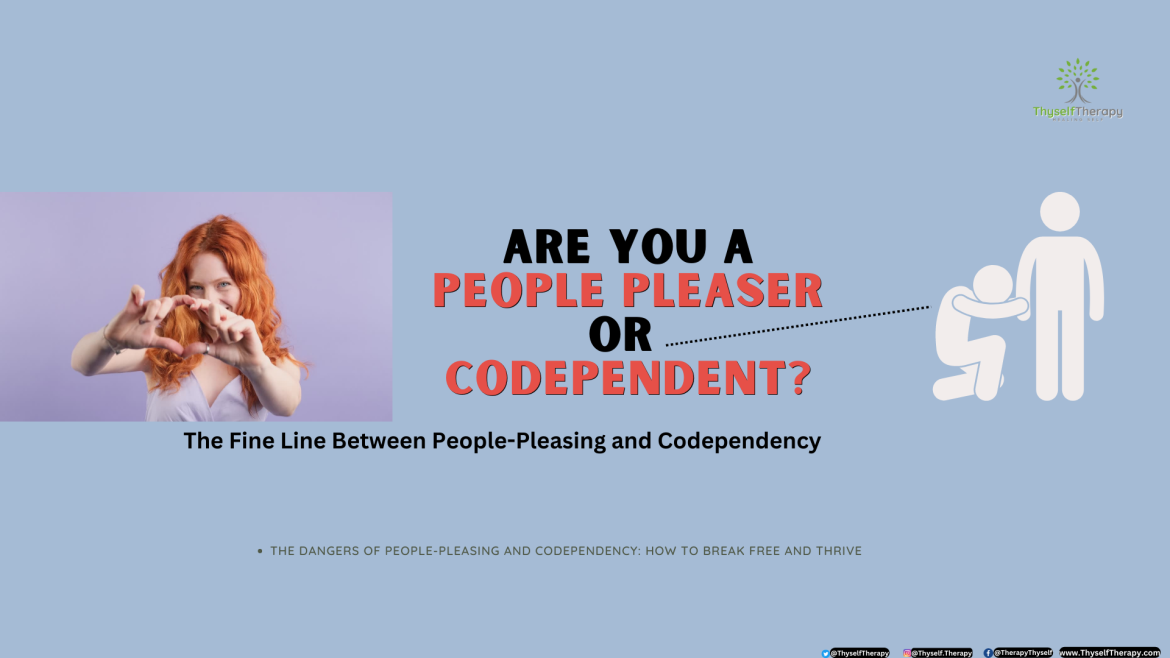To be people-pleasing is to put other people’s wants and needs ahead of one’s own. Those who tend to be people-pleasers put the needs of others ahead of their own and will go to great lengths to avoid causing tension or disappointing others. People often act this way because they want to be liked, accepted, and appreciated by those around them.
People-Pleasing vs Codependency: What’s the Difference?
Are people-pleasing and codependency the same?
It’s common to hear people-pleasing and codependency used interchangeably, but these concepts are distinct. While they share some similarities, these ideas also stand on their own.
On the other hand, codependency is a pattern of behaviour in which a person is too emotionally, psychologically, and physically dependent on a relationship or person. Codependents have trouble saying “no,” have trouble taking care of themselves, and may enable or control the people in their lives.
It’s important to note that not all codependents are people-pleasers and vice versa. Pleasing others in moderation can benefit the person and their relationships, but depending too much on others is unhealthy.
[highlight background=”” color=””]Recommended read:[/highlight] What is Codependency
The Difference between People-Pleasing and Codependency
The degree to which one gives in to others’ desires and needs is the primary dividing line between people-pleasing and codependency. People-pleasing is a more common and often harmless behaviour pattern than codependency, which is more extreme and could be harmful.
In moderation, people-pleasing is a positive trait because it demonstrates care and concern for the welfare of those around them. People-pleasing isn’t bad in and of itself, but it can be when it gets in the way of a person’s happiness and satisfaction in an unhealthy way.
Conversely, codependency is a bad behaviour pattern that hurts the person and their relationships. Codependents may have trouble saying “no” and may not know how to care for themselves. In their relationships with other people, they may be enabling or controlling.
People-pleasing is driven by the desire to be liked and accepted by others, while codependency is driven by a deep emotional and psychological need for a relationship or person.
The Consequences of People-Pleasing and Codependency
Both try to please others, and being too dependent on others can hurt the person and their relationships.
As a result of putting the needs and wants of others ahead of one’s own, people-pleasing can make people resentful. Also, people-pleasing can lead to burnout because it can make people feel like they have too many expectations of them.
The repercussions of codependency can be considerably more devastating. Codependents may have trouble saying “no” and may not know how to care for themselves. They may have to enable or dominate tendencies in their relationships with other people. This might start a vicious cycle of negative behaviour that is hard to break.
Codependency can also lead to physical health problems like heart disease and other stress-related illnesses and major mental health problems like anxiety and depression.
How to Overcome People-Pleasing and Codependency
People-pleasing and codependence can be hard habits to break, but it is possible to do so with self-awareness and a willingness to change. These behaviours often stem from a deep-seated need for validation and acceptance and can lead to a pattern of sacrificing one’s own needs for the sake of others. This can result in a lack of healthy boundaries, self-esteem issues, and a cycle of dependence that can be difficult to break. To stop people-pleasing and codependence, you need to know yourself, think about yourself, and be willing to change your behaviour.
Practical Steps to Overcome People-Pleasing and Codependency
- Practice Self-Awareness: Increasing one’s awareness of oneself is the first step toward overcoming people-pleasing and codependence. Be aware of your inner state and actions to determine if you’re putting the needs of others ahead of your own. Think about the motivations behind your actions and the benefits you anticipate from them.
- Set Healthy Boundaries: Setting appropriate limits is another vital step. This involves developing the ability to set boundaries and put one’s wants and needs first. At first, this could be challenging, but you’ll become used to it with time and effort.
- Build Self-Esteem: Low self-esteem is a major contributor to people-pleasing and codependence, so improving your sense of value is crucial. Self-care activities like working out, practising mindfulness, and going to counselling can help. Fill your life with upbeat, encouraging people. You.
- Focus on Your Own Needs: Attempt to occasionally put yourself and your requirements first. Saying no to requests that don’t fit with your priorities or making time for self-care and development are two examples of how this might be done.
- Seek Professional Help: Seeking the advice of a therapist or counsellor can be beneficial if you are having trouble overcoming people-pleasing and codependency on your own. They can assist you in identifying and processing the emotions and experiences fueling your undesirable behaviours and provide you with the knowledge and skills you need to change.
If you or someone you know has a problem with people-pleasing or codependency, it’s important to look at your behaviour patterns and ask yourself why you act the way you do. Talking to someone you trust, such as a family member, close friend, or mental health professional, can help.
- The Dangers of People-Pleasing and Codependency: How to Break Free and Thrive

